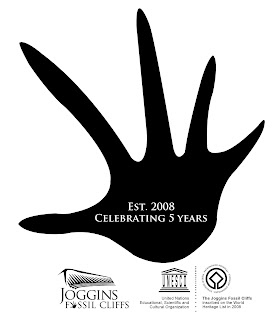JOGGINS FOSSIL INSTITUTE WRAPS UP SUCCESSFUL 5TH
ANNIVERSARY OF UNESCO WORLD HERITAGE SITE INSCRIPTION
As the official operational season draws to
a close, the Joggins Fossil Institute reflects back on a successful season of increased
visitation, programming and 5th anniversary celebrations.
July 7, 2013 was the
official anniversary date that the Joggins Fossil Cliffs was inscribed on to
the UNESCO World Heritage list. Given
this, the Joggins Fossil Institute (the non-profit, charitable organization
that co-manages the Joggins Fossil Cliffs UNESCO World Heritage Site and the
Joggins Fossil Centre) looked at the entire season as a time to celebrate and
reflect on the last five years.
The signature event of
the season was their inaugural fundraiser called “Cocktail Party in the
Carboniferous” (Carboniferous is the time period in earth’s history the UNESCO
site represents). They also hosted a well-attended
community BBQ and “celebrity beach sweep”, featured a summer-long art exhibition by
Québecois artist Bernard Pelletier who has created paintings of all of Canada’s
UNESCO World Heritage Sites commissioned by Parks Canada, hosted a monthly
educational series and weekly kids summer camps. The season also included their annual
Mother’s Day Brunch, Father’s Day Lobster Dinner, Adopt-A-Highway cleanup and
Great Canadian Shoreline Cleanup.
The final event of the season will be a
Children’s Halloween Party on Saturday, October 26, 2013 featuring the Maritime
Reptile Zoo from Halifax. The party will
be from 1:00 – 3:00 PM and kids (and parents) are encouraged to come in
costume. The cost to attend is $7 for a child
and adult, $12 for a family of 3 and $15 for a family of 4 or more. Kids must be accompanied by an adult. The annual Christmas “Sidewalk Sale” & Lunch will be held on Sunday, December 15th from 11:00 am – 2:00
pm. There will be up to 50% off selected
items in the gift shop, complimentary tea, coffee and cookies and soup, chowder
and biscuits available for purchase.
The
Institute has also partnered with the Gillespie House Inn, Black Rock Bistro
and Fundy Geological Museum this fall and created a “Fall Fossil Finder”
overnight package. The package is
available until October 31st and can been booked by contacting the
Gillespie House Inn in Parrsboro at 1-877-901-3196. The package includes
overnight accommodations, breakfast and dinner and admission to both Fundy
Geological Museum and Joggins Fossil Centre.
In
addition to events and programming throughout the season, revenue from paid
visitation and educational programming increased by 20% this year. “In a
province where tourism has seen some decline and little growth over the last
few years, these numbers are very encouraging and great to see” commented,
Stephanie Viera, Operations Manager for the Institute.
Even though the main operational season ends October 31st, the Institute welcomes inquiries for school group or meeting group visits year round. For additional information about the Centre and any upcoming events, call 902-251-2727 or visit http://www.jogginsfossilcliffs.net.
Even though the main operational season ends October 31st, the Institute welcomes inquiries for school group or meeting group visits year round. For additional information about the Centre and any upcoming events, call 902-251-2727 or visit http://www.jogginsfossilcliffs.net.





.JPG)
.JPG)
.jpg)




.tif)
















